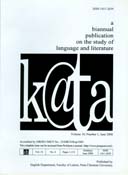The Homeland of Stereotypes
DOI:
https://doi.org/10.9744/kata.20.2.53-59Keywords:
Ambivalent character, Captive Mind, Nativization, Negative Formula, Orientalist Discourse.Abstract
Following the trenchant critique of orientalism, orientalist discourse has employed complex strategies to create ambivalent non- Western stereotypes. The earlier fixed oriental characters are often discarded; they are instead accorded certain amounts of flexibility. However, the fact is that despite such changes and these less negative images, orientalist discourse continues producing the Oriental other to perpetuate Western domination. In fact, it simply draws upon old repertoire of stereotypes, recycles them, and produces new ones; only care is taken that they do not sound as markedly negative as the old ones. The present paper seeks to investigate how the American TV series Homeland (2011-) repeats the imperialist claims of the orientalist discourse by presenting a range of oriental character types, from the classic Muslim terrorist to some less negative characters. It employs “Negative formulas” to produce more ambivalent stereotypes to reinforce the alleged essential superiority of America. The series stages the character of the captive mind as the ideal oriental type to be imitated by all Orientals. The paper also demonstrates that how Homeland employs the orientalist theme of nativization, again only to prove the eventual un-contaminability and superiority of the West. Islam and Iran are the particular targets of Homeland’s stereotyping.
Downloads
References
Ashcroft, B., Griffiths, G., & Tiffin, H. (2013). Postcolonial Studies: Key Concepts. London and New York: Routledge.
Ashcroft, B., & Ahluwalia, P. (2009). Edward Said. London and New York: Routledge.
Bhabha, H. K. (2004). The Location of Culture . London and New York: Routledge.
Brown, P. (1992). This Thing of Darkness I Acknowledge Mine: The Tempest and the Discourse of Colonialism. In J. Dollimore, & A. Sinfield, Political Shakespeare: Essays in Cultural Materialism. Manchester: Manchester University Press.
Fanon, F. (2004). The Wretched of the Earth Translated by Richard Philcox. New York: Grove Press.
Gandhi, L. (1998). Postcolonial Theory. Crows Nest, Australia: Allan & Unwin.
King, R. (2001). Orientalism and Religion Postcolonial theory, India and ‘the Mystic East’ . London and New York : Routledge .
Merican, A. M. (2012). Beyond Boundedness: Imagining the Post-colonial Dislocation. In S. Nair-Venugopal, The Gaze of the West and Framings of the East (pp. 45-59). Basingstoke: Palgrave Macmillan .
Said, E. (1994). Culture and Materialism. New York: Vintage Books.
Said, E. (2003). Orientalism. London: Penguin Books.
Sandhu, A. (2007). Intellectuals and People. Great Britain: Palgrave MacMillan.
Sandres, F. S. (2000). Who Paid The PiPer. Great Britain: Granta Book.
Sardar, Z. (1999). Orientalism. Buckingham and Philadelphia: Open University Press.
Stam, R., & Spence , L. (2006). Colonialism, Racism and Representation. In B. Ashcroft, H. Griffiths, & H. Tiffin, The Post-Colonial Studies Reader (pp. 109 - 112). London and New York: Routledge.
Turner, B. (2003). Orientalism, Postmodernism and Globalism. London and New York: Routledge.
Upstone, S. (2010). British Asian Fiction: Twenty-first Century Voices. Manchester: Manchester University Press.
Downloads
Published
How to Cite
Issue
Section
License
![]() This work is licensed under a Creative Commons Attribution License
This work is licensed under a Creative Commons Attribution License



.png)
.png)

















